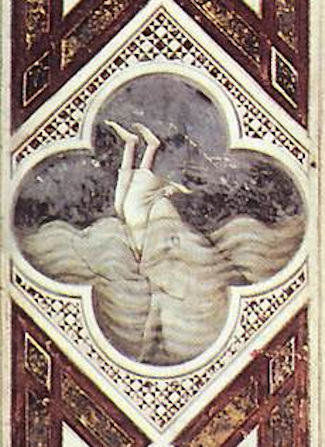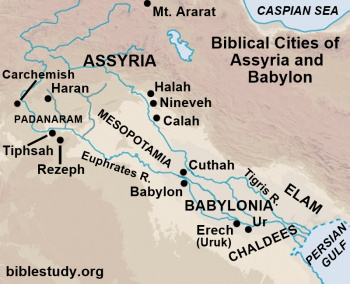Jonah's name is recorded 12 times in 10 New Testament verses. These verses are Matthew 12:39 - 41, 16:4, Luke 11:29 - 32, and John 21:15 - 17.
Jonah's name, in Hebrew, means "dove" (Strong's Concordance #H3124).
[Why Is the Bible Hard to Read?]
According to Jewish tradition, Jonah was the son of the widow of Zarephath, whom Elijah raised from the dead (1Kings 17:8 - 24).
Why Are They Minor?
The Minor Prophets (in alphabetical order) are Amos, Habakkuk, Haggai, Hosea, Joel, Jonah, Malachi, Micah, Nahum, Obadiah, Zechariah, and Zephaniah. Why are these men labeled as "minor?"
[Map of Assyrian Empire at its Peak!]
The books of the above twelve prophets are considered "minor" since each is much shorter than the writings of "major" prophets such as Isaiah (sixty-six chapters), Jeremiah (fifty-two chapters), and Ezekiel (forty-eight chapters).
Rulers of God's People
Who were the rulers over Israel and Judah when Jonah wrote his book in 798? The ruler of the Kingdom of Israel (the northern ten tribes) was King Jehoash. He ruled from 798 to 782 B.C. The sovereign over the Kingdom of Judah was Joash who reigned from 835 to 796 B.C.

Unique Brutality
Jonah had quite a few reasons to dislike the mighty Assyrians (see Jonah 1:1 - 3, 4:1 - 2, 9 - 11). One of the most stark condemnations of the empire was its unique brutality and violence even by the generally accepted standards of the time.
"Assyria was a ruthless enemy that practiced brutality on men, women, and children. Their armies destroyed and looted; they buried their enemies alive and even skinned them alive; they impaled people on sharp poles and left them to burn in the sun." (Wiersbe Expository Outlines).
"The excavations which have been so successfully prosecuted have supplied a fund of information as to the manners and habits of the Assyrians . . . War was waged with ruthless ferocity . . .
"And the sculptures exhibit the modes of cruelty practiced upon those that were subdued. They were flayed, they were impaled; their eyes and tongues were cut out; rings were placed in their lips; and their brains were beaten out with maces." (People's Dictionary of the Bible).

[World Empires from Babylon to the Beast!]
The Assyrians would reach the zenith not only of their power but also their brutality under the reign of King Ashurbanipal (668 to 627 B.C.). The level of violence he promoted was simply evil. He wrote the following regarding the acts of punishment he carried out.
"I captured many troops alive: from some I cut off their arms [and] hands; from others I cut off their noses, ears, [and] extremities. I gouged out the eyes of many troops. I made one pile of the living (and) one of heads. I hung their heads on trees around the city, I burnt their adolescent boys [and] girls . . ." (Military History of the Neo-Assyrian Empire).
More Reasons
Another reason for Jonah's resentment of Nineveh and the growing power of Assyria was its relationship with the Kingdom of Israel.
King Shalmaneser III, who reigned from 859 to 824 B.C., was the empire's first sovereign to come in contact with God's people. King Jehu of Israel, who ruled from 841 to 814, became a vassal of Assyria when he began to pay tribute starting in the first year of his rule (Mysterious Numbers of the Hebrew Kings).
Israel's King Jehoash, who ruled from 798 to 782 B.C. during Jonah's ministry, also paid tribute money to Assyria. He paid it to King Adad-nirari III possibly starting in 796 (ibid.). Adad-nirari's reign ran from 811 to 783 B.C.